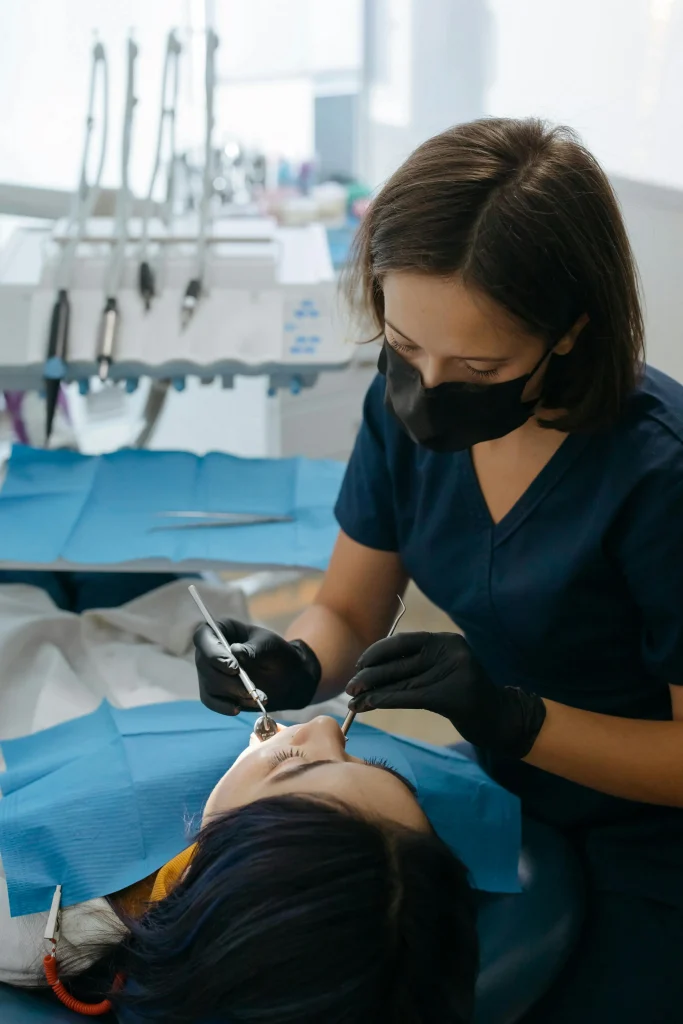
Services

Why do Wisdom Teeth Need to be Removed?
Wisdom teeth, also known as third molars, are the last set of teeth to develop, typically emerging in the late teens or early twenties. Not everyone has enough space in their mouth for these teeth, which can lead to issues such as pain, impaction, crowding, or infection.
The goal of evaluating and treating wisdom teeth is to prevent potential complications and maintain your oral health. If you’re experiencing discomfort or have questions about your wisdom teeth, don’t hesitate to reach out for an evaluation.
Benefits
Prevent Pain and Protect Other Teeth
Early removal of wisdom teeth can prevent future pain and discomfort while protecting your other teeth from shifting, crowding, or damage.
Reduce Risk of Infection and Improve Oral Health
Removing wisdom teeth reduces the risk of gum infections, cysts, cavities, and gum disease, making it easier to maintain good oral hygiene.
Peace of Mind
Regular monitoring and timely removal of wisdom teeth provide peace of mind, helping you avoid unexpected dental issues in the future.
Process
How will it work?
Although most patients have wisdom teeth, not all wisdom teeth are the same. At EOS we will evaluate your wisdom teeth and develop a custom treatment plan that addresses your wisdom teeth in a safe and comfortable manner.

Initial Consultation and Evaluation
Your journey beginInitial Consultation and Evaluation: Your journey begins with a visit to our oral surgeon, where we discuss your dental history, examine your mouth, and use X-rays or 3D scans to get a detailed view of your wisdom teeth and surrounding structures.s with a visit to our oral surgeon, where we discuss your dental history, examine your mouth, and use X-rays or 3D scans to get a detailed view of your wisdom teeth and surrounding structures.
Personalized Treatment Plan
Based on the evaluation, our surgeon will develop a tailored treatment plan. We’ll explain the details, discuss any concerns, and determine if wisdom teeth removal is necessary.
Surgery Preparation and Procedure
Before the procedure, we’ll provide clear preparation instructions and discuss anesthesia options. On the day of surgery, our team will perform the removal with minimal discomfort using advanced techniques.
Recovery and Aftercare
After surgery, you’ll receive detailed home care instructions to manage discomfort, maintain oral hygiene, and ensure a smooth recovery. We’ll support you throughout the healing process.
Frequently
Asked Questions
Still have questions? Contact us to learn more.
What are wisdom teeth?
Wisdom teeth are the last set of molars that typically appear in your late teens or early twenties. They are called “wisdom teeth” because they usually come in when you’re a bit older and (hopefully!) wiser.
Why do wisdom teeth need to be evaluated?
Wisdom teeth can sometimes cause problems if they don’t have enough room to grow in properly. They can become impacted (stuck under the gum or bone), grow in at an angle, or crowd other teeth. Evaluating them helps us see if they might cause issues and if they should be removed.
What happens during a wisdom teeth evaluation?
During an evaluation, the oral surgeon will examine your mouth and may take X-rays to see the position of your wisdom teeth. This helps determine if they are impacted or if they might cause problems in the future.
Do all wisdom teeth need to be removed?
Not necessarily. If your wisdom teeth are healthy, fully erupted, and positioned correctly, they may not need to be removed. However, if they’re impacted, causing pain, or likely to cause dental problems, removal may be recommended.
What are the common signs that wisdom teeth need to be removed?
Common signs include pain at the back of the mouth, swelling around the gums, difficulty opening your mouth, and bad breath. If you notice any of these symptoms, it’s a good idea to schedule an evaluation.
How is wisdom teeth removal done?
The removal is typically done by an oral surgeon. You’ll receive anesthesia to ensure comfort during the procedure. The surgeon will make a small incision in the gum, remove the tooth, and then close the area with stitches if necessary. The procedure is usually quick and can often be done in the office.
What should I expect after wisdom teeth removal?
After the procedure, you might experience some swelling, discomfort, and mild bleeding. The surgeon will give you instructions on how to care for your mouth, including what foods to eat and avoid. Most people recover within a few days to a week.
Are there any risks associated with wisdom teeth removal?
As with any surgery, there are some risks, including infection, dry socket (a painful condition where the blood clot at the removal site dislodges), and nerve damage. However, these complications are rare, and your oral surgeon will take steps to minimize these risks.
How can I prepare for wisdom teeth removal?
Follow your surgeon’s instructions, which may include fasting for a certain period before the procedure and arranging for someone to drive you home afterward. Wear comfortable clothing and try to relax—your oral surgeon will take good care of you!
Can I keep my wisdom teeth if they aren’t causing problems?
Yes, if your wisdom teeth are healthy and not causing any issues, you may not need to have them removed. However, regular check-ups are important to monitor them for any future problems.
Schedule an Appointment
Schedule your consultation with EOS today to discuss your wisdom teeth and learn more about the removal process. Our team is here to ensure your comfort and safety every step of the way.

